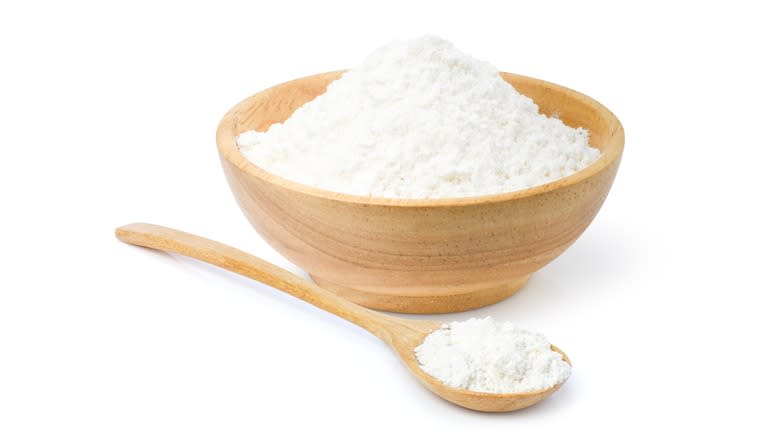The Science That Sets Alsa Baking Powder Apart From Most American Brands

Some baking enthusiasts swear by Alsa, a brand of baking powder from France, over American brands. Part of the reason some bakers prefer this ingredient can be tied to Alsa's composition and the underlying science of how it works.
To understand the science behind Alsa baking powder, it helps to understand the difference between baking soda and baking powder. Baking soda falls on the basic end of the pH scale and must be activated by an acid. Recipes that call for baking soda will also call for something like lemon juice or cream of tartar to achieve this. The resulting chemical reaction produces carbon dioxide, which helps give cakes and other baked items a light and fluffy texture. Baking powder, on the other hand, combines traditional baking soda and acid in a single product.When you mix Alsa baking powder with liquid, it immediately starts to form carbon dioxide gas. Because the mixture reacts only once, this type of baking powder is referred to as single-acting. Single-acting baking powders have a quick reaction time that is ideal for things like donuts, which are more likely to crack when made with a slower double-acting baking powder. This latter type produces carbon dioxide when combined with liquids and again when introduced to heat. Double-acting baking powders make up the majority of commercial baking powders available on the U.S. market.
Read more: 16 Little-Known Facts About Salt
Many U.S. Baking Powders Contain Aluminum-Based Acids

While Alsa relies on a single acid (sodium pyrophosphate), double-acting baking powders typically contain two such as monocalcium phosphate and sodium aluminum sulfate. Combining monocalcium phosphate with wet ingredients triggers an instant reaction, allowing the leavening process to begin. The aluminum-based sulfate helps make the baking powder double-acting because it causes a release of gas when exposed liquid at a high temperature. This ensures confections continue to rise during the baking process, instead of just when combined with wet ingredients. Some double-acting powders may only contain a single acid like monocalcium phosphate, which not only produces carbon dioxide when it comes into contact with liquid but does so again to a lesser degree during heat exposure.
Aluminum-based compounds such as sodium sulfate and sodium aluminum sulfate often play an important role in how double-acting baking powder works. Both are acidic, react to the combination of liquid and heat, and affect how long carbon dioxide is released. Aluminum-free double-acting baking powders do exist but tend to release gas faster than double-acting varieties that have aluminum. So if you delay putting your dough-slash-batter in the oven, it may not rise as much.
Another way double-acting baking powders differ from Alsa involves taste. If you've ever baked a batch of muffins and found them tasting slightly metallic, aluminum-containing baking powder is likely the culprit. In contrast to many American brands, Alsa baking powder's use of sodium pyrophosphate means baked goods won't have that metallic flavor.
Read the original article on Mashed.


